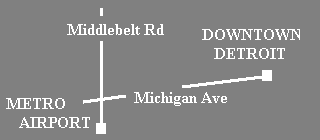To return, use the "back" button on your web browser.
costs |

|
|
The routes follow existing paths thus few changes are needed. The capacity to move 40 to 70 thousand more passengers per day exists, so people paying for $50/month passes can largely support this system. Since many people are compassionate of the need to support an operating tax for a transit system they don't use very much, then certainly people will pay at the farebox when in fact they would prefer their cozy car, cell phone and stereo to help SMART. Why not "I'd walk a mile to help mass transit" instead of "I'd walk a mile for a cigarette? These are known facts
Given the above facts Each route will need 8 buses running back and forth 24 hrs. to provide 15 min. service Each bus will need 6 drivers and each route will need two mechanics which is 1 for every 4 buses. 8 x 6 = 48 + 2 = 50 workers. 50 x $80K(approx. yearly salary with benefits for an average union transit worker) = 4 million x 2 (number of routes) = 8 million. Other costs such as gas, insurance, administration ect are to be studied, but are likely much less then wages, so assuming $4 million, the costs are $12 million. Number of people in data base to pay for monthly passes are then 50 x 12 x 20,000 = $12 million, thus about 20,000 people will have to be interested in this service to make it affordable starting with the two routes above. With out of town visitors, park and ride and pay at the farebox riders and advertising on buses the number is lower but needs to be high enough to justify costs. |
To return, use the "back" button on your web browser.